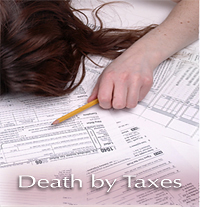| Death, Taxes ... and More Taxes |
 |
|
By Sam Batkins
Thursday, December 03 2009 |
It has been said that taxes are the price we pay for living in a civilized society. If that’s true, with the federal government collecting over $2 trillion in taxes this year, civility must be at an all-time high. Unsatisfied, however, the House of Representatives took another swing at the tree of liberty this week when it increased the Death Tax from 0% to 45%. Unfortunately, that figure is no typo. Speaker Pelosi and her gang of class warfare acolytes voted to raise the Death Tax, euphemistically referred to as the “Estate Tax,” from 0% in the year 2010 to 45%. Under current law, the Death Tax was set to expire on January 1 with the rate dropping to 0%, but liberals in Congress apparently couldn’t stomach a tax cut under their watch. Massive tax hikes, well, they’re part of the party platform. What’s most insulting to taxpayers and small businesses hit with the Death Tax is that it’s portrayed as a “Robin Hood” tax that prevents “the rich” from hoarding their money. The facts reveal this assertion to be misleading at best, and an utter lie at worst (likely the latter). For example, under current law, anyone who simply inherits a house in a major metropolitan area like New York or San Francisco suddenly is likely to be considered “rich.” A quick glance through the Forbes list of billionaires, however, reveals that inheritance is hardly par for the course for the affluent. The list of luminaries (Bill Gates, Warren Buffet, Michael Bloomberg and Michael Dell) who grace the pages of Forbes are all self-made entrepreneurs. They didn’t inherit their wealth, and they never needed a stimulus or a bailout from the government to create wealth, jobs or change the way the world works. Liberals talk about the Death Tax like it is sacrosanct, some great revenue equalizer in the sky that steals from the rich and gives to the poor. The reality is slightly less romantic. In 2008, the tax raised only $29 billion, which sounds like a large number but represents only 1% of federal tax revenues. For perspective, the U.S. spent $28 billion to expand credit availability for small businesses in this year’s budget. What’s at stake for the future of the Death Tax is more than just federal revenue or grandiose rhetoric about income inequality, though. It’s about jobs. With 10.2% unemployment, Congress should spend every waking moment considering ways to make it easier for Americans to save, invest and create new job opportunities. But raising taxes on capital and wealth won’t lower the unemployment rate. Rather, it will increase the number of unemployed. According to former Congressional Budget Office (CBO) Director Douglas Holtz-Eakin, the Death Tax destroys hundreds of thousands of jobs each year. In a recent paper, Holtz-Eakin estimated that full repeal of the Death Tax would create 1.5 million jobs, cut the jobless rate by up to 1% and increase small business capital by over $1.6 trillion. So if the Death Tax supposedly costs so little to the federal government and would benefit the economy so greatly, why do liberals in Congress oppose reform? It’s simple. Just as liberals can’t bear to end obsolete or ineffective government programs, they can’t stand to see taxes disappear. It’s an affront to their ideology, their sensibilities and to their way of life. Once a federal program starts “giving,” it must continue to give, no matter the costs. Once a tax is enacted, it must remain in place no matter the burden imposed on society. Unintended consequences be damned; Congress is always right. But for the rest of America, the stakes for the final vote on the Death Tax couldn’t be higher for very different reasons. In addition to capital losses and job destruction, the worst part of the Death Tax is measured by the number of small businesses that are sold, the houses that are foreclosed on and by the endless legal planning families must endure in an attempt to comply with the tax. We’re told that death and taxes are the only assurances in life. We’re never told, however, that death doesn’t end the taxation. Americans spend an average of 78 years paying taxes only to have Congress chase after their casket to retrieve what little remains at the end. Since most Americans already feel that they’re taxed to death, it’s time that Washington stop taxing death and give taxpayers at least one refuge from Uncle Sam’s grim reach. |
Related Articles : |
























